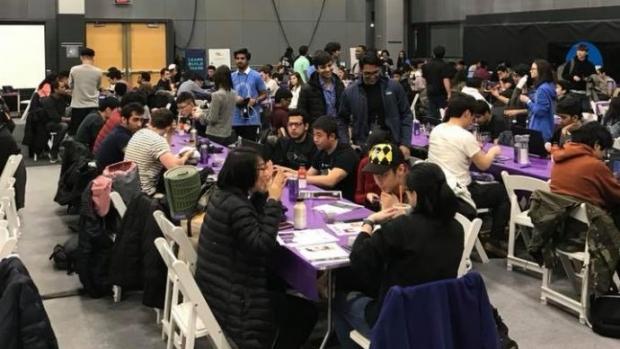Building Tech for Social Good at HackNYU 2018

This year's HackNYU had 80 project submissions from students hailing from colleges and high schools across the Northeast, as well as NYU Abu Dhabi and NYU Shanghai.
If you’ve ever been to a hackathon, you know the excitement that courses throughout the room when teams come together to brainstorm ideas and develop their project. This year’s HackNYU event was no different. Fueled with pioneering ideas and perhaps a lot of coffee, 500 participants hailing from colleges and high schools across the Northeast, as well as NYU Abu Dhabi and NYU Shanghai, spent the 48-hour hackathon building apps, software, and technology. One of the biggest global hackathons run entirely by students, HackNYU brings people together who share a common goal of merging technology and innovation with social good.
From March 23-25, 2018, participants gathered at NYU’s global campuses including NYU Tandon in Brooklyn. After finding their teams on the first day, students quickly started off developing their ideas into prototypes and demos. Projects centered around four areas, known as tracks, for which teams generated solutions, products, and services.
HackNYU Tracks
- Accessibility & Assistive Technology
- Sustainability & Social Impact
- Healthcare
- Education Technology
This year’s theme of building technology for social change inspired 80 project submissions, including ones that enable nervous people to ask questions in class (Clarify), help people who are hearing impaired (Resonate), and streamline clothing donations and recycling (Clothly).
The Sustainability and Social Impact track had the most submissions of the four tracks for the first time. HackNYU also continued its advancement of interdisciplinary projects. “Nearly every track this year had winning teams with at least one high school member. While some were comprised of members from the same school, others showed representation from multiple universities,” shared Stefan Cherubin, an NYU Tandon graduate student in computer science and the HackNYU Education Technology Committee Chair.
Twelve teams won top prizes within the four tracks as well as prizes from industry partners like Google, Facebook, BNY Mellon, JPMorgan Chase & Co. and Major League Hacking (see below for full list of winners). Though most of the teams met each other for the first time, a majority of the projects have enough momentum to become a full-fledged startup, including two teams forged from NYU Tandon students.
One project called DermaScan featured NYU Tandon computer science graduate students developed a mobile application with deep learning capabilities that can detect melanoma through your smartphone camera. Led by Mohammed Ilyas Habeeb, Harshit Srivastava, and Antonio Mallia, the team trained its deep neural network through a massive dataset of images. While a first-step in classifying melanoma in patients, they hope their product could be used to detect other skin issues and help dermatologists provide better care.
Safelet is a smart bracelet created by Angie Gonzalez, an electrical engineering student, and Shu-Hsien Huang of NYU College of Arts & Sciences. Aimed at helping women and men in dangerous and unsafe situations, including domestic violence and assault, Safelet includes a button to call 911, voice record & gather evidence, and even provide their GPS location to specific contacts and emergency officials. “Safelet will be significantly cheaper and won’t look like a fitbit, but a piece of jewelry,” Gonzalez said. “We also have a mobile app component that is disguised as a game, that can deter children and/or abusers from identifying it as a life-saving application connected to an everyday bracelet.” Safelet won the JPMorgan Chase & Co.: Best Hack for Disaster Relief and Recovery.
HackNYU 2018 Winners
Education Technology
- Clarify
- Carlos Michael Rodriguez, Jevons Wang, Elliot Winch, and Bo Peng (NYU CAS), Rachel Rub (NYU Stern)
- ARTranslator
- Matteo Sandrin (NYU Tandon)
- IdeaCloud
- Shakil Rafi, Jerry Ye, and Shaina Peters (Stuyvesant High School), Yesmeen Elgabori (Yonkers High School)
Sustainability & Social Impact
- Cupcycling
- Rupal Mehta, Bryan So, and Sagari Datta (NYU Tandon)
- IntentCoin
- Srinivas Piskala Ganesh Babu (NYU Tandon), Deren Lin and David Margolin (Hunter College), Jeane Carlos (St. Johns University)
- Clothly (This project was also winner of Best Domain Name from Domain.com Category)
- Stanley Zeng, Danny Lin, Salman Siraj, Justin Huang, and Kevin J. Zheng (NYU Tandon)
Accessibility & Assistive Technology
- MedTime
- Alex Weis, Laura Liu, Alden Lamp, and Mehul Ghosal (Millburn High School)
- SenseFood
- Divyendra Patil, Rahul Yadav, Poornima Pundir, and Sagar Jain (Stevens Institute of Technology)
- Echo Journal
- Alberta Kovatcheva and Mohammed Yassem (NYU Tandon), Andres Rabellino (NYU CAS), Sunjana Kulkarni (John P. Stevens High School), and Noor Khalil (Johns Hopkins University)
Healthcare
- AVA
- Mohamad Sherif (Middlesex County College), Rishab Nayak (Boston University), Anas Elghafari (NYU Tandon), Sarthak Poshattiwar and Alok Tibrewala (George Washington University)
- Nutrition Lens
- Wangyue Wang, Xiaofan Ni, and Tianyu Wang (NYU Tandon)
- Insta Cal
- Zhengyi Li (NYU Tandon), Jiayang Li (Columbia University)
Camila Ryder
Graduate School of Arts and Science
Master of Arts in English Literature, Class of 2018




